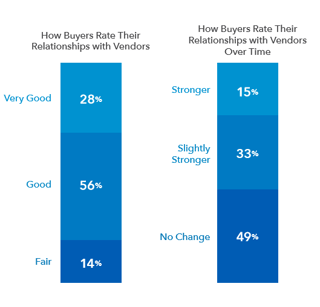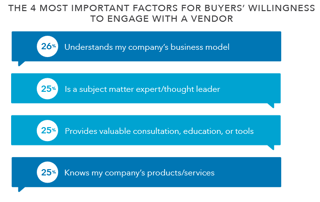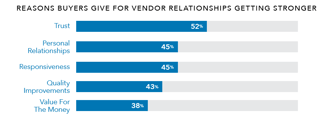The salesperson's role is to acquire new clients and/or generate more revenue from existing clients. After a deal closes, it's often passed off to an account manager of a fulfillment team. The on boarding process and the ongoing customer experience are vital to customer retention. Moreover, in a traditional sales model, the original salesperson may be unaware of any problems or issues until it is too late.
LinkedIn published an eBook entitled "Re-Think the B2B Buyer's Journey". It shows compelling evidence of the importance of the customer experience. The report states that a large number of clients enjoy working with their vendors, and their experience is good, but not necessarily great.

To garner a competitive advantage and strong reputation in the marketplace, offer a great customer experience every time and keep the salesperson involved with the customer. Here are 5 tips for creating a great customer experience every time.
1. Communicate Communicate Communicate
A closed deal is a win for the salesperson. Often times to close the deal some promises and commitments are made that must be fulfilled by an operations or fulfillment team. High volume salespeople are required to move from one deal to the next, often preventing the salesperson from staying connected to the new customer, and this can put the ongoing relationship at risk.
What if the salesperson actually held himself/herself accountable for part of the customer experience, after the deal is closed? Communication is the key to any relationship, and alignment between the sales and operations department is key. A good salesperson will talk with the operations team and regularly check in on new accounts, maintaining and enhancing the relationship and trust that took so much effort to build.
Communication creates raving fans and raving fans are long term clients. A win for sales and a win for the company.
2. Continue to Challenge and Educate
Statistics show that 39% of elite salespeople are challengers and 8% are relationship builders. Challengers are generally more successful because of their commitment to educate and challenge the buyer and preconceived notions of what will work best.

The most effective salespeople - and the most successful companies - make their customers smarter and give them an edge on their competition. Work with your team to consistently educate the customer on current trends in the marketplace. Remain current on the customer's business model and show them ways to improve.
3. Know your value
Surveying existing clients using Net Promoter Score or some other method can be a catalyst for growth. Always knowing where your clients stand is likely a competitive advantage. Furthermore, asking a question about value will glean more insight. How does the client value the work that your company performs? The client may love working with you, but just isn't seeing the value to their business. Understanding where you are on the value scale can provide improvement opportunities. If the client gives high satisfaction and high value scores, rest assured the customer experience is great.
4. Trust, Relationships, and Response Time

To maintain a strong relationship with your client, ongoing trust is critical. Personal relationships and responsiveness follow closely behind. The client's trust in the salesperson is ultimately the reason for the deal closing. Throughout the entire process and especially after the close, always do what you say you are going to do. Consistently following through on commitments will maintain and build trust.
For many salespeople the personal relationship is easy and requires little additional effort. Asking about the family, showing a true interest in birthdays and holidays comes so naturally and should be maintained, even after the close.
If the client has a need and reaches out always respond in a timely manner. IF the call can't be taken or the situation is too in depth for an immediate response, acknowledge the message and commit to responding at a specific time.
5. Social Engagement
Follow your clients on LinedIn, Facebook, Twitter and any other social channel in which they're involved. A "like", and sharing and/or commenting on a social post by a client will go a long way. The client will be aware that you are paying attention and haven't forgotten about them.
Social engagement is also a key component for referrals. If the salesperson is engaged with the vendor through social mediums, others will see it, leading to an increase in social visibility. This may generate interest from other companies, creating potential for more referrals.
In summary an elite salesperson's job is not over with a close. Continuing to build and expand on the professional relationship that was built throughout the sales process will certainly aid in customer retention and create a great customer experience. Being accountable to create and maintain raving fans will lead to client retention, up sell opportunities and more referrals.







Agree, disagree, or just have something to add?
Leave a comment below.